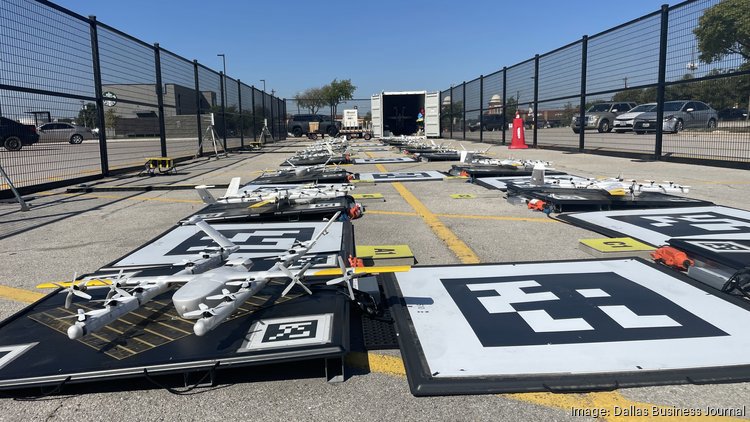DALLAS — This article was originally published in the Dallas Business Journal. Read the original article and more business content here.
Don't worry. That distant buzzing sound in the Walmart parking lots isn't an incoming swarm of bees. It's likely a drone lifting off with a customer's order, headed for a nearby backyard.
With new authorizations from the Federal Aviation Administration, drone delivery companies have taken flight across Dallas-Fort Worth. Most recently, Walmart (NYSE: WMT) launched the first drone delivery service option in Fort Worth at 8520 N. Beach St. in August, through its partnership with Wing, part of Google umbrella company Alphabet Inc. (Nasdaq: GOOGL). Wing already delivers at eight other Walmart locations in DFW, including from stores in Arlington, Frisco, Lewisville and North Richland Hills.
More locations are on the way, as Wing begins to expand services and another drone company, Zipline, comes online to serve more locations by the end of the year.
Wing and Zipline are leaders in the convergence of delivery technology and e-commerce. The tech has seen extensive testing — including by Wing at Hillwood's AllianceTexas Mobility Innovation Zone in Fort Worth — but many questions remain about how it will be treated by consumers, businesses and governments. Employees at Wing and Zipline recently revealed to the Dallas Business Journal more about what the operations look like and why the companies are investing so heavily in DFW.
While operating drones typically requires the pilot to always see the aircraft, the FAA is allowing companies to fly beyond the line of sight because of new advancements in air traffic technology and procedures. The companies are making history as some of the first drone companies in the same airspace to fly out of sight, according to a July announcement from the FAA.
Walmart, the world's largest retailer, announced plans at the beginning of the year to serve up to 1.8 million households across DFW by partnering with the companies. Wing and Zipline will act as third-party logistics providers of the delivery services.
Jacob Demmitt, spokesperson for Wing, said the company makes about 150 deliveries a day from drone charging stations, called "nests," to people's homes. When a delivery order is ready, the drone hovers at 23 feet up in the air and lowers a tether so an employee can attach a box with a product inside it. Then, the drone lifts the tether, ascends to 200 feet in the air, and travels up to 65 miles per hour to the customer's house. The drones can deliver within a 6-mile radius.
"The actual service area is kind of like an amoeba shape," Demmitt said. "If there's a water tower, and the drone has to curve around the water tower, then the range on the backside of that water tower is going to be shorter than if it's flying over a field and it's going a straight line, so you get kind of this funny shape."
The drones are mostly autonomous, but "pilots" such as Joshua Pye keep an eye on the airspace and weather conditions from an office. Usually, one pilot watches over multiple locations, said Pye, who is pilot in command at Wing. The most common items ordered? Everything from energy drinks to chalk. The service comes down to convenience, he said.
"What was the purpose of the middle of the summer, somebody needing chalk? Maybe they wanted their kids to literally do a chalk drawing on the driveway," Pye said. "It's delivered to the driveway ... saved them time of actually having to go to the store, be inside some of this crazy DFW traffic."
San Francisco-based Zipline will also start drone deliveries for Walmart locations in DFW around the end of the year. Specific cities and locations haven't been released yet. The company started working with Walmart in 2021 in Pea Ridge, Arkansas, which has a population of just under 7,000. Zipline was founded in 2014 and now makes deliveries in four states and six other countries such as Rwanda and Japan. According to its website, the company's autonomous drones have made 1.19 million deliveries.
Eric Watson, an engineering lead at Zipline, said the delivery system is focused on precise and high-volume deliveries. Once the aircraft, called a Zip, leaves a Walmart and arrives above its destination, it lowers a droid that's tethered to the aircraft that unloads the package. The aircraft can carry up to eight pounds. If the order is heavier, it has to be split up into multiple shipments.
A recent survey Wing conducted with 5,000 respondents on grocery habits validates the demand for the service, said Nate Milner, director of strategy and operations at the company. One of the standout statistics from the survey, according to Milner, was that 81% of respondents said they were interested in ultra-fast delivery within 30 minutes, and 76% were willing to pay. Currently, Wing does not charge for delivery. Wing states on its website that the drones can deliver within 30 minutes.
"Consumers want things faster and effectively," Milner said. "We can go deeper into the grocery space."
He said Wing does not set delivery fees — that will ultimately be decided by the companies' customers such as Walmart. Currently, Walmart+ members pay a $12.99 delivery fee for drone orders, and nonmembers pay $19.99 per delivery, according to its website.
Currently, Wing drones can carry up to 2.5 pounds, but Milner said they are working to increase the drone's payload to five pounds. Milner said they expect to continue to scale and expand in Dallas-Fort Worth, reaching up to 75% of the population, the coverage pledged by Walmart. Overall, the municipalities they have expanded to have bought into the technology.
"They're driving the acceleration, they're driving the collaboration and marketing and just the overall exposure," he said.
But the new technology will certainly lead to policy debates and changes. Some have worried that drones ferrying packages back and forth from stores to homes could become a nuisance.
The City of Plano in February updated zoning rules to allow drone delivery hubs, although not all council members agreed on the vote. Three council members who voted against the updates cited concerns with enforcement of screening requirements, part of an ordinance that requires storing equipment out of site, usually behind masonry walls.
Privacy is another chief concern. Bo Mei, an associate professor of computer science at Texas Christian University, wrote in a university blog post reacting to a drone delivery announcement in Fort Worth that the use of low-resolution cameras for navigation purposes and not capturing live feeds or photographs are good steps toward ensuring privacy. Wing states its drones do not provide live images to anyone, including pilots, and all cameras are low-resolution, for example.
"The success of maintaining privacy also depends on how transparent the program is with the public and how responsive it is to any concerns that arise," Mei wrote. "Public trust can be built through clear communication about how data is collected, stored and used."
Mei said regular audits and assessments by third-party firms can help ensure privacy standards are being met.
Carlo Capua, chief of strategy and innovation at the City of Fort Worth, said he visited the Walmart location to see the drone deliveries for himself and asked Wing representatives about concerns related to privacy and noise. He said it's part of the city's job to educate residents on what drone delivery is and what it isn't.
"This is the future of how we're going to consume and I love the idea of Fort Worth leading the charge," he said. "We're helping build the model that will change how people order and how they shop for the rest of the world."
Wing and Zipline aren't the only drone companies with their eyes set on DFW — the Israeli company Flytrex is also operating in Granbury and Little Elm. The University of Texas at Arlington is also building a $2.3 million netted drone facility in Fort Worth to conduct research, according to a Sept. 10 announcement.



